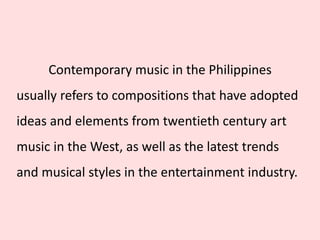Contemporary music, also known as contemporary classical music, is a type of classical music that has been created recently. It is characterized by its departure from traditional musical conventions such as tonality and rhythm. With advancements in technology and the accessibility of music on various platforms, contemporary music has become more widely available to listeners. It encompasses a wide range of genres and styles from different cultures around the world. Despite its unique characteristics, contemporary music continues to evolve and stay relevant, making it an important and integral part of today’s music landscape.
What period is contemporary music?
Contemporary music is heavily rooted in the 20th century. It was during this time that composers started delving into harmonic sounds rather than just relying on scales or chromatic compositions. They started experimenting with complex time signatures, rhythms, and melodies that didn’t always follow traditional musical conventions. Contemporary music is not limited to any one genre and is constantly evolving, making it an everlasting art form. It encompasses a wide range of music that was written in the 20th century and is still being composed today.
What are some characteristics of contemporary music?
Contemporary music is known for its complexity and variety. Some of the characteristics that define contemporary music include:
- Complex time signatures: Contemporary music often uses unconventional time signatures, such as 7/8 or 5/4, which adds complexity to the rhythm.
- Pitched percussion: Instruments like triangles and maracas are commonly used in contemporary music to create unique and distinct sounds.
- Electronic instruments: With advancements in technology, contemporary music incorporates electronic instruments and synthesizers to create new and innovative sounds.
- Lack of lyrics: While contemporary music can have lyrics, it’s not uncommon to find instrumental pieces that focus on the music itself rather than vocals.
- Lack of structure: Unlike traditional forms of music, contemporary music may not follow a clear structure in terms of pitches and rhythmic patterns. It embraces experimentation and creativity.
- Harmonic chord progressions: Contemporary music often includes complex and non-traditional harmonic chord progressions, pushing the boundaries of tonality.
- Chromatic and atonal melodies and harmonies: Contemporary music explores melodies and harmonies that go beyond the traditional diatonic scales, creating dissonance and tension.
- Variety in orchestration: Contemporary music utilizes a wide range of instruments and takes advantage of the vast colors and textures that different instruments can provide.
- Tonal, modal, and atonal music: Contemporary music incorporates a mix of tonal, modal, and atonal elements, blending different musical styles together.
These characteristics make contemporary music intriguing and unique. It’s a genre that embraces experimentation and pushes the boundaries of traditional musical conventions.

How is contemporary music different from other types of music?
The difference between contemporary music and other types of music can vary depending on how individuals perceive and define different genres. If someone considers classical music after 1750 as another form of contemporary music, they would find similarities in terms of complex harmonies and chord progressions. However, if classical music is seen as a distinct genre, contemporary music stands out with its tonal melodies, heavy reliance on rhythm and percussion, and lack of traditional harmonic structures.
Contemporary music also differs from other genres in terms of its relevance and popularity. Every generation has its own idea of what makes a song “contemporary,” and the popularity of contemporary music is a significant factor in determining its classification. In today’s society, music plays a crucial role in expression and connection, and contemporary music represents the emotions and ideas that connect people worldwide.
Importance of Contemporary Music
Contemporary music holds great importance in today’s society. It serves as a means of expression, allowing individuals to convey their emotions and ideas. In a world heavily influenced by technology and connectivity, contemporary music acts as a common language that bridges gaps and connects people from different cultures and backgrounds.
Contemporary music is constantly evolving as each generation brings its own unique sound and perspective. By labeling music as contemporary, it acknowledges its relevance and up-to-date nature in a rapidly changing world. Without contemporary music, the world would be a monotonous and stagnant place. It adds vibrancy and freshness to the musical landscape, providing a platform for new voices and ideas to be heard.

Contemporary Music Composers
Contemporary music has produced remarkable composers who have made a significant impact on the genre. Some notable contemporary music composers include John Williams, Phillip Glass, and Ennio Morricone.
John Williams is known for his iconic film scores, including the Star Wars series, Jurassic Park, and the Harry Potter films. His compositions have become timeless and have contributed to the popularity and recognition of contemporary music.
Phillip Glass is a modern composer known for his minimalist style. His works often feature repetitive patterns and unconventional structures. Glass has composed music for films such as The Truman Show, Notes on a Scandal, and Batman v Superman: Dawn of Justice.
Ennio Morricone, one of the most influential composers of contemporary music, is best known for his work in the spaghetti western genre. His compositions for films like The Good, the Bad, and the Ugly and Once Upon a Time in the West have become synonymous with the genre. Morricone’s inventive use of orchestration and unique melodies have left an indelible mark on contemporary music.
These composers, among many others, have contributed to the richness and diversity of contemporary music through their innovative compositions and influential soundtracks.
Contemporary Music Genres/Types
Contemporary music encompasses a wide range of genres and types. Some of the most popular genres within contemporary music include blues, hip hop, R&B, and rap.
Blues originated in America and has its roots in African-American folk music. Over time, it has evolved into different subgenres such as Delta blues, Piedmont blues, and Chicago blues. Contemporary blues has gained popularity and recognition, drawing influences from gospel and country music.
Hip hop emerged in the 1970s in New York City and has since become a global phenomenon. It is heavily influenced by blues and has been incorporated into various contemporary music styles. Artists like Mary J. Blige, Jay-Z, and Drake have seamlessly integrated elements of hip hop into their music.
R&B (Rhythm and Blues) has been a significant influence on contemporary music. Artists such as Chris Brown and Rihanna have achieved tremendous success, combining R&B with other genres like hip hop, pop, and soul.
Rap, a genre that emphasizes rhythm and wordplay, has gained mainstream acceptance and popularity in recent decades. Artists like Outkast, Kanye West, and Eminem have revolutionized rap and brought it into the realm of contemporary music.
These genres showcase the diversity and dynamism of contemporary music, highlighting the wide range of influences and styles that contribute to its ever-evolving nature.

Summary
Contemporary music is an ever-growing and ever-changing genre that pushes the boundaries of musical conventions. It is rooted in the 20th century and encompasses a wide range of musical styles and influences. Contemporary music is characterized by its complexity, variety, and experimentation. It breaks away from traditional tonality and rhythm, embracing atonal melodies, complex harmonies, and unconventional time signatures.
The importance of contemporary music lies in its relevance and popularity in society today. It serves as a means of expression and connection, bringing people together through a shared appreciation for music. Contemporary music composers, such as John Williams, Phillip Glass, and Ennio Morricone, have made significant contributions to the genre through their innovative compositions.
Contemporary music genres, including blues, hip hop, R&B, and rap, showcase the diverse range of influences and styles within the genre. Each genre brings its unique characteristics to contemporary music, contributing to its vibrancy and richness.
In conclusion, contemporary music is a genre that continuously evolves and adapts to the changing musical landscape. It represents the sound of our time and serves as a powerful means of expression and connection. Its importance and impact in society cannot be understated, making it an integral part of our lives.






